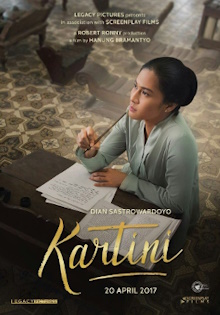I learned about the existence of this film in a roundabout way, from reading an article about the historical figure by the economist Alice Evans. It’s strange to me that I’ve never heard of her before as she was Indonesian and this biographical film about her is available on Netflix. It’s a little too sentimental at times and tries too hard to achieve a happy ending when in fact the real Kartini died tragically young at the age of 25. Overall though it’s an outstanding production by the Indonesian film industry that champions a feminist heroine in a part of the world that is distinctly hard on women.
R.A. Kartini was one of the many daughters of Raden Adipati Sosroningrat in the late 19th century, Regent of Jepara on the island of Java. Her mother was Ngasirah, a commoner. In order to ascend to the position of Regent, her father had to marry a noble, hence her birth mother was relegated to the status of a servant in the household. Unlike most of the women of her era, Kartini was well educated and intelligent, being fluent in Dutch and held feminist viewpoints. Even so when she entered puberty, she was forced into seclusion as required of the female nobility. She deeply resented this restriction and with the assistance of a brother, she found her escape in books. Later when two younger sisters joined her in seclusion, she taught them to read as well. She wrote essays during this time and her Dutch friends helped to get them published. She also championed the cause of a local community of wood carvers, hoping to create an export market for their products. Her brothers attempt to block her communications with the outside world for fear of her radical views being spread. Later one of her younger sisters is forced to marry an already married nobleman in order to fulfill a previous promise by their father, and Kartini herself too must eventually marry.
It seems that Kartini is considered a national heroine in Indonesia with a special day dedicated in her honor and even Rupiah banknotes bearing her visage. That makes it somewhat less surprising that their film industry would spend a considerable budget on making this historical biography. I’m not certain how accurate this version of her story is and as I’ve mentioned, it does rather gloss over the harshest edges in order to end on a happy note. There was a 26-year age difference between her and her husband Joyodiningrat which isn’t obvious at all from the choice of the actor chosen to play him. Even so, I’m impressed by the quality of the production and the seriousness with which they presented the themes here. She is unquestioningly an icon of female empowerment and her resentment against a social order that holds women back while allowing men to do just about anything they want shines through. In one notable scene, her and her sisters cry through the forced wedding while a brother happily flirts and dances with the female entertainers. I’m no expert but the details of life of the period, with the palace, the horse and carriage, the way the servants must crawl along the floor, the specifics of the wedding ceremony, even the use of the pre-electricity iron for clothes, all look convincing and satisfying to me.
It’s also interesting to note the parts where the film is bold and where it is cautious. For example, Kartini’s father readily accepts that her ideals are a challenge to the traditional social order but argues that change is coming anyway. Yet Kartini’s mother also successfully convinces her that Western values don’t encompass devotion and that it is her love for Kartini’s father and her children that she debases herself. Indeed it is part of the national propaganda of Indonesia to reframe her as a dutiful daughter and wife while deemphasizing her radical feminist views. Similarly the film highlights how Kartini was definitely a Muslim and that there is no conflict in Islam about women receiving an education just like men. Yet there is so much in the manner of dress, behavior and rituals shown here that reminds me of Buddhism as practiced in Thailand. This is such a rich and fascinating period in Indonesia’s history and this little glimpse of it only whetted my appetite for more.
This still suffers from all of the usual faults of biographical films in that it presents an incomplete and at times not wholly accurate version of events. Still I’d rate this as a very respectable attempt to portray the life of a interesting historical figure. It’s a terrible shame that Kartini’s life was cut so short as she was clearly capable of so much more and I feel this loss actually makes the story of her life more poignant. It’s also a shame that I never heard of her before this and that Netflix never recommended this to me even though its algorithm should be clever enough to know that this is exactly the type of content that I would like. I’d highly recommend this to anyone who is from Southeast Asia.
